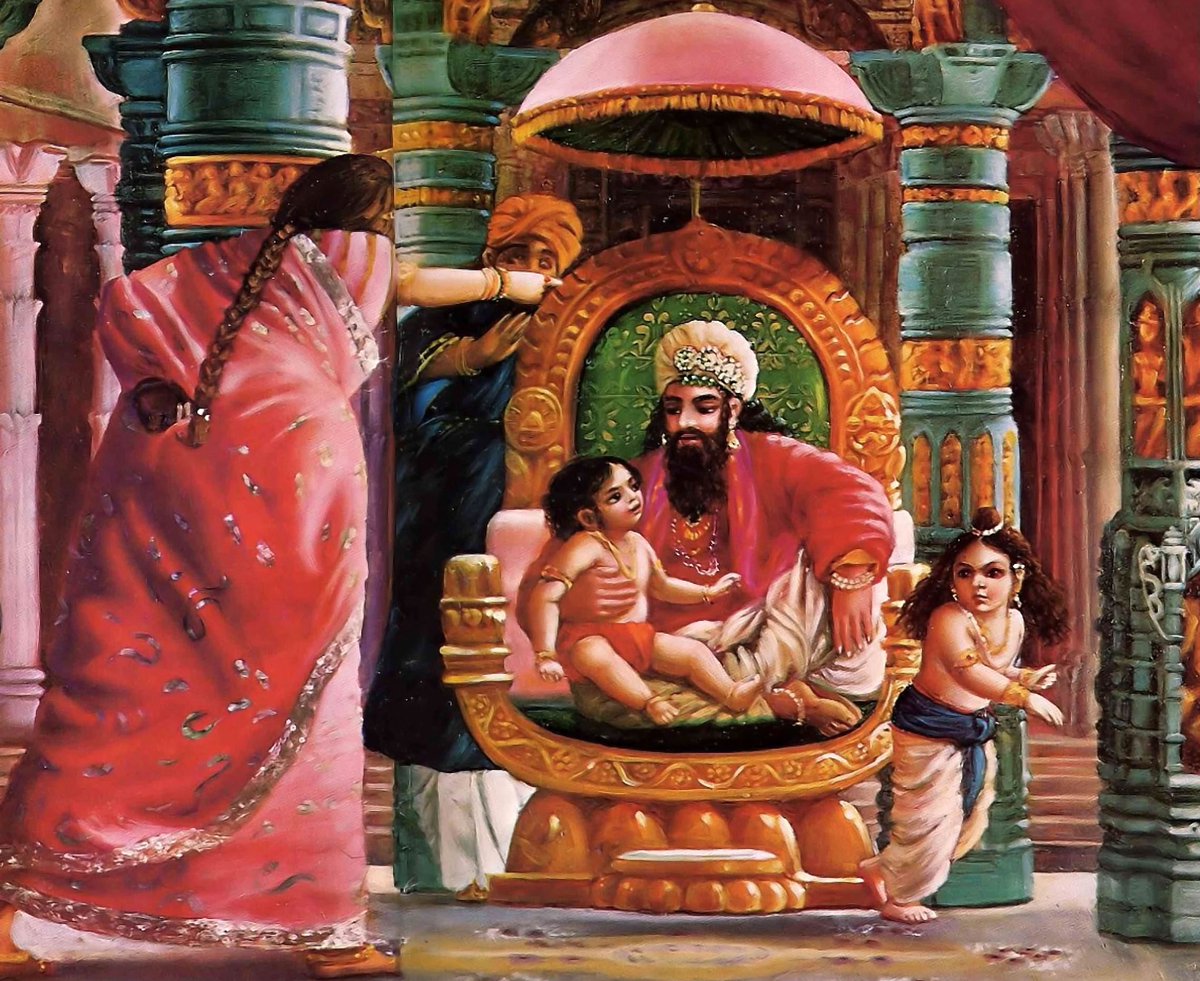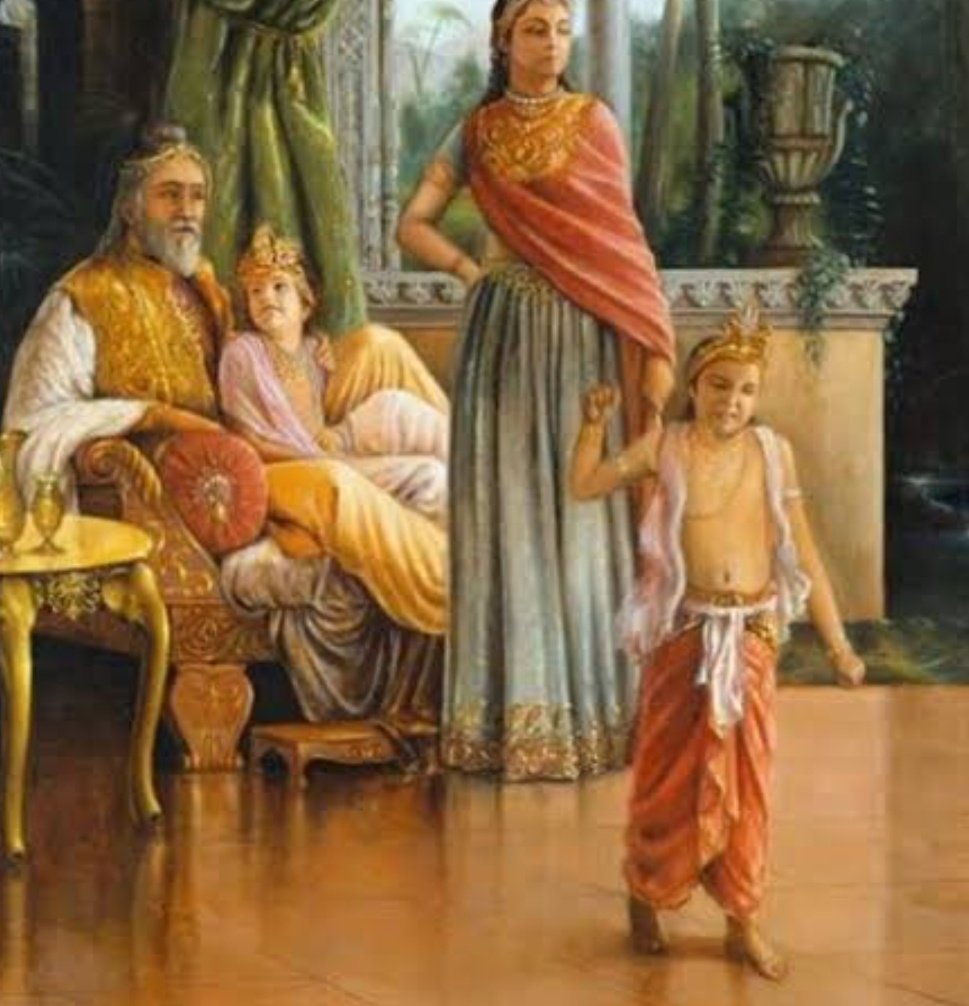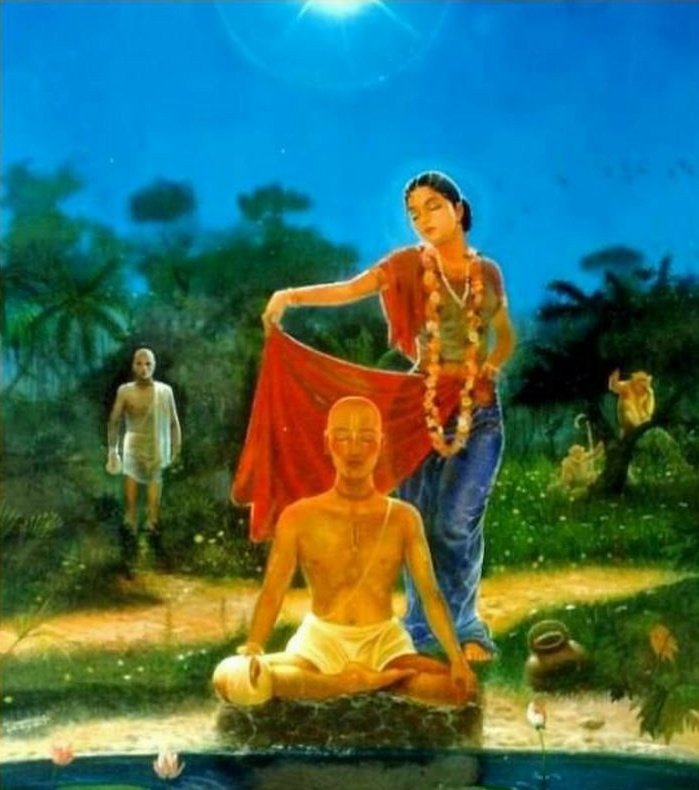
If one studies the Life of Dhruva,
It is again Not the possession of great Knowledge But a tremendous Commitment.
&
The Mantra that he was taught to chant invoking Śrī Maha Viṣṇu was ; ॐ नमो नारायणाय🙏
(1/13)
#BhajaGovindam
It is again Not the possession of great Knowledge But a tremendous Commitment.
&
The Mantra that he was taught to chant invoking Śrī Maha Viṣṇu was ; ॐ नमो नारायणाय🙏
(1/13)
#BhajaGovindam

Dhruva as a young boy was distanced by his father due to the bad influence of his step-mother.
When his stepbrother was sitting on the lap of his father,
as a child Dhruva too wanted to sit on his father’s lap.
The stepmother did Not allow him & said,
‘No, You can sit on the
When his stepbrother was sitting on the lap of his father,
as a child Dhruva too wanted to sit on his father’s lap.
The stepmother did Not allow him & said,
‘No, You can sit on the

lap of your father Only if you were born out of me.’
This statement made Dhruva unhappy & he went to his mother in despair.
Dhruva’s mother being a noble lady did not add fuel to fire.
She did Not create jealousy nor did she create anger in little Dhruva towards his step-mother.
This statement made Dhruva unhappy & he went to his mother in despair.
Dhruva’s mother being a noble lady did not add fuel to fire.
She did Not create jealousy nor did she create anger in little Dhruva towards his step-mother.

She went about saying, ‘Go & meet Paramātmā.
There is nothing wrong in the words of your step-mother’.
That statement instilled in Dhruva a commitment to seek the higher.
He moved into a forest as a child & set about meditating with a commitment that he had to come face to
There is nothing wrong in the words of your step-mother’.
That statement instilled in Dhruva a commitment to seek the higher.
He moved into a forest as a child & set about meditating with a commitment that he had to come face to

face with Paramātmā.
Rṣi Nārada was wandering in the forest & taking pity on little Dhruva dissuaded him from taking the harsh reality of a forest Life.
Đ great Rṣi Nārada advised, ‘You know the dangers of the forest, it’s Not for you little one, go back to the comfort of
Rṣi Nārada was wandering in the forest & taking pity on little Dhruva dissuaded him from taking the harsh reality of a forest Life.
Đ great Rṣi Nārada advised, ‘You know the dangers of the forest, it’s Not for you little one, go back to the comfort of
palace & company of your mother’. Dhruva replied,
‘Oh! great Rṣi, with your blessings everything is Possible.
Please bless me’,
& he went ahead in search of the Paramātmā.
A Unique place amongst the star — Dhruva Nakshatra is named after him.
Let us take up another Kathā from
‘Oh! great Rṣi, with your blessings everything is Possible.
Please bless me’,
& he went ahead in search of the Paramātmā.
A Unique place amongst the star — Dhruva Nakshatra is named after him.
Let us take up another Kathā from

the Purāna.
Bhākta Prahalad did not possess a great Knowledge. But his commitment was something monumental.
There are innumerable instances which I can keep quoting,
But the underlining fact in all these cases is nothing other than un-Quenching thirst for Enlightenment.
Bhākta Prahalad did not possess a great Knowledge. But his commitment was something monumental.
There are innumerable instances which I can keep quoting,
But the underlining fact in all these cases is nothing other than un-Quenching thirst for Enlightenment.
Let us be inspired by Puṇya Ātmā's in the above examples as far as commitment for enlightenment is concerned.
When we start looking Life with such commitment one brings a homeostasis of one’s Head & one’s Heart.
It is a combination of one’s head oriented understanding &
When we start looking Life with such commitment one brings a homeostasis of one’s Head & one’s Heart.
It is a combination of one’s head oriented understanding &

heart oriented feelings that are going to bring about an inner alchemy which is beyond the realm of both Head & Heart.
Āḍi Śaṅkarācarya with deep love & commitment invites us to
Seek the Paramātmā,
Seek the Paramātmā
&
Seek the Paramātmā,
as we have sought enough here & there.
Āḍi Śaṅkarācarya with deep love & commitment invites us to
Seek the Paramātmā,
Seek the Paramātmā
&
Seek the Paramātmā,
as we have sought enough here & there.

I would like to draw your attention to closely watch the lineage of
Teacher ~Guru,
Disciple — Śiṣya
&
Tradition — Parampara.
He stands out as the most outstanding teacher because of his style of addressing that includes all types of people.
Teacher ~Guru,
Disciple — Śiṣya
&
Tradition — Parampara.
He stands out as the most outstanding teacher because of his style of addressing that includes all types of people.
That is why he is known as Shankaram — Loka Shankaram.
He covers all type of people in his unfoldment.
This has been his singular most important contribution towards Humanity
& therefore with deep respect let us all close our eyes
He covers all type of people in his unfoldment.
This has been his singular most important contribution towards Humanity
& therefore with deep respect let us all close our eyes

& bow down to the great master humbly who has devoted his whole life for bringing about this Spiritual awakening.
Please open your eyes.
Bring about this Spiritual awakening.
Let us go Śloka by Śloka & understand the Unfoldment. Now don't be too
Please open your eyes.
Bring about this Spiritual awakening.
Let us go Śloka by Śloka & understand the Unfoldment. Now don't be too
caught Up in your Understanding of Knowledge.
Just feel it.
Bring Forth your Head & also Heart,
& just feel the Ślokas.
Let your Head be tuned towards your Heart with an Understanding to feel these Ślokas from the Head & the Heart.
भज गोविन्दं भज गोविन्दं गोविन्दं भज मूढमते।🙏
Just feel it.
Bring Forth your Head & also Heart,
& just feel the Ślokas.
Let your Head be tuned towards your Heart with an Understanding to feel these Ślokas from the Head & the Heart.
भज गोविन्दं भज गोविन्दं गोविन्दं भज मूढमते।🙏

• • •
Missing some Tweet in this thread? You can try to
force a refresh















